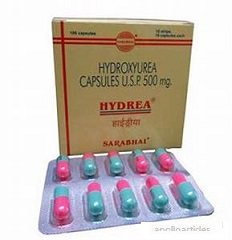Hydrea (Hydroxyurea) Canada
Description
Hydrea belongs to a group of FDA approved cancer treatments. Containing Hydroxyurea as an active ingredient, the medication features a potential impact on sickled red blood cells and cancer cells in the body. Thus, the drug is appreciated and widely prescribed to eliminate the symptoms of ovarian cancer, skin cancer, chronic myeloid leukemia and certain other cancer types. Additionally, the medication can be used in order to decrease pain episodes and blood transfusion necessity in patients with sickle cell anemia. However, keep in mind that Hydrea will not cure any of the disorders. Ask your healthcare provider about off-label Hydrea use.
Recommendations
 Take the medication in accordance with a prescription and safety information. You should never change the adjusted dose, length of the therapy or other specifications without doctor’s assistance; otherwise, you risk getting undesirable side effects. Inform your physician about weak Hydrea impact on the organism, and he/she may occasionally change the prescription. The remedy is advised for regular use, with or without food, but with much water for proper body functioning. Hydrea promotes the best effect if used once a day or once each three days. The intake recommendations will be determined by your doctor, based on the treated condition, its severity and the overall health state of the patient. Anyway, Hydrea should be administered at around the same time of the day. The medication is available in a capsule, which should never be broken, opened or crashed, as it bears a potential risk of side effects occurrence. Your healthcare specialist may require frequent medical tests in order to track the progress of the therapy
Take the medication in accordance with a prescription and safety information. You should never change the adjusted dose, length of the therapy or other specifications without doctor’s assistance; otherwise, you risk getting undesirable side effects. Inform your physician about weak Hydrea impact on the organism, and he/she may occasionally change the prescription. The remedy is advised for regular use, with or without food, but with much water for proper body functioning. Hydrea promotes the best effect if used once a day or once each three days. The intake recommendations will be determined by your doctor, based on the treated condition, its severity and the overall health state of the patient. Anyway, Hydrea should be administered at around the same time of the day. The medication is available in a capsule, which should never be broken, opened or crashed, as it bears a potential risk of side effects occurrence. Your healthcare specialist may require frequent medical tests in order to track the progress of the therapy
Precautions
Do not start Hydrea therapy without doctor’s prescription. Certain medical conditions may interact with the treatment, aggravating the existing health complications and activating new disorders. Thus, warn your doctor about any illnesses, impairments or diseases you are diagnosed with, emphasizing on kidney dysfunctions, increase level of the uric acid in the blood, history of skin cancer, decreased level of platelets in the blood, liver disorders, HIV or AIDS, anemia, bone marrow suppression, pancreas problems and others.
The remedy is contraindicated for people, who are sensitive to Hydroxyurea or other ingredients. Besides, pregnant and breastfeeding women should avoid the medication intake for their own safety. Severe birth defects may be caused by Hydrea use during pregnancy. Replace your birth control pills with non-hormonal options to avoid pregnancy during the therapy.
Drug Interactions
A range of other non-prescription and prescription treatments may interact with Hydrea, stimulating the appearance of undesirable side effects and abnormal reactions. Inform the doctor about all the pharmaceutical products and supplements you are using in order to prevent complications. Pay ultimate attention to Interferon, Didanosine, Stavudine and others.
Side Effects
As any other medication, Hydrea can lead to mild and severe side effects. Headache, dizziness, hair loss, stomach discomfort and similar symptoms serve common Hydrea reactions. Call your doctor and report any complications after the medication intake. Seek emergency medical help if the drug intake resulted in allergic reactions, pancreas issues, symptoms of liver disorders, numbness, urination disorders, decreased immune system and others.

